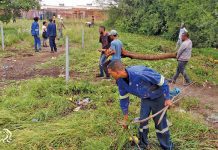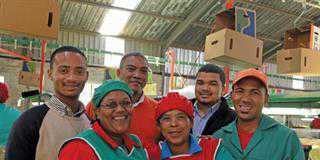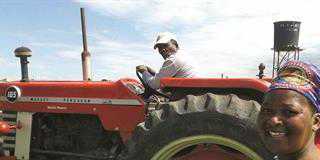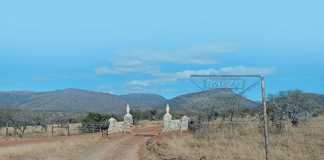Too often the South African dream of a united, prosperous farming sector has turned into a nightmare of land invasions, boundary disputes and farm murders. Now a small community of grape exporters in North West is showing the dream can come true if a few simple rules are followed. Stephan Hofstätter went to see what they’re doing right.
WHEN NTOMBI MSIMANG moved to a farm on the Hartbeespoort irrigation scheme near Brits she was puzzled by the occasional appearance of a car circling her property at dusk. Later she discovered it was one of her neighbours, Johan van Staden, who was worried about the safety of a woman living alone in an isolated farmhouse. “He only stopped patrolling when I put up burglar bars and a security gate,” says Msimang. “I was touched.
Later I realised that’s just how the people are round here.” Racially abusive white farmers understandably get plenty of airplay in SA. This fuels perceptions, easily exploited by politicians, that they are not exceptions but the norm. At one time the Brits district was a notorious hotbed of white supremacists. But rather than being confronted with racial prejudice, Msimang experienced the opposite with her white neighbours. “They really embraced me in so many ways,” she explains.
Soon after she moved in, another neighbour invited her to the technical workshops that rotate among the 12 table grape farms in the district, where farmers gain first-hand exposure to improvements or innovations implemented by their neighbours. “It’s a tight-knit community and they wanted me to learn from their successes.” Her first pruning day, which could make or break her harvest, illustrates the point. “Farmers from all over just started arriving to help me, making sure my workers mixed the pruning solution correctly and that everything went smoothly,” she recalls. “I was really impressed.”
Now Msimang joins her neighbours for weekend braais. “They call me Boerevrou,” she laughs. When asked how established grape farmers reacted to the arrival of their new black neighbour, Corrie Botha – whose farm Windemeer is one of the district’s top performers – gazed at his ripening crop to be exported to England. “I suppose you are talking about racial undertones,” he says at last. “No. At the end of the day a farmer is a farmer – black or white. We have the same mannerisms and the same concerns.” For Botha the latter amounts to being vulnerable to farm attacks and competing with countries where farmers are heavily subsidised and receive ample support in research, farm infrastructure and rebates. “I don’t feel we get any support from government or industry. These days it’s not about black or white – it’s farmers against the world.”
But pitching in to help Msimang was not entirely altruistic. “Everyone has a vested interest in the success of their neighbours,” Botha explains. “For example, we all share cooler room costs that decrease the more successful farmers there are.” The district exports most of its harvest to the UK, with farmers paid in sterling. In the last five years the rand has gained ground, which means income shrank as input costs rose. “This drove a lot of farmers out of business,” says Botha. “We don’t want to lose any more farmers. We welcome the new ones coming in, and want to make sure they succeed.”
Msimang makes her mark Despite getting off to a shaky start, Msimang has not disappointed. She bought the 28ha Sunny View Farming with a Land Bank loan in 2004. At the time she was working for a Dutch-based NGO, specialising in rural micro-finance, and lived in Pretoria. She hired a manager to handle day-to-day farm operations, visiting when she could. By the end of 2004 she realised she was heading for bankruptcy. “I was paying an exorbitant interest rate and a manager’s salary. It was not sustainable,” Msimang recalls. Her first step was to negotiate more favourable loan terms.
Eventually she secured a sponsored rate through government finance vehicle Khula and Absa. By May 2006 she’d moved to the farm to manage it herself. ”I came here cold. All I had was a farm and the will to make it happen. But I knew if I was to make a success of this, I’d have to be hands on.” The combination of Msimang’s commitment and business savvy, unflinching support from her neighbours and excellent technical back-up from the agriculture department has yielded impressive results.
In under a year she was able to comply with the stringent EU export rules related to water quality, fertiliser use and spraying cycles. Being in possession of the covetted EU accreditation certificate meant Msimang exported 25 palettes of 160 boxes each at the end of 2006, and gave her a competitive edge locally. “I contacted Fruit and Veg City in Pretoria and told them I could supply them with export quality grapes. I took in a sample and they asked me to deliver the next day. Having EU accreditation also helped me negotiate a good price.” Msimang estimates total revenue from her first harvests will top R300 000.
Next year, with improved farm management and further investment in infrastructure, she expects to more than double her turnover without planting new vines on the 16ha of unused land still available, and make a profit within three or four years. “Farming is hard work in a hostile environment,” she says. “But once it gets under your skin it’s the most rewarding job in the world.” |FW
Since her appointment as land and agriculture minister last year, Lulama Xingwana has stressed that her department must jack up support services for new entrants. Complaints from black farmers about the difficulty in accessing infrastructure grants or technical advice are widespread. This was partly what prompted Xingwana to appoint the Public Service Commission to probe institutional flaws resulting in poor service delivery.
Ntombi Msimang, and the hands-on support she received from government extension officer James Wallace, exemplifies what Xingwana wants replicated throughout South Africa. Soon after relocating to her farm, Msimang visited the agriculture department in Brits to enquire what services were on offer. Wallace was dispatched. One of his first tasks was to analyse the soil, which turned out to be phosphate poor as a post harvest fertiliser wasn’t applied the previous season. This led to uneven budding with bunches reaching different growth stages at the same time, making them difficult to control. He rectified this with a pre-budding fertiliser. “I always say grapes need to sleep on a full tummy.”
A key lesson Wallace tries to impart is the importance of implementing an effective farm management package, and that timing is crucial. Water needs must be analysed and the right irrigation method chosen for soil and climate conditions; the irrigation regime must be carefully controlled to suit growing stages and weather conditions; herbicides and fertiliser must be applied in the right quantities at the right time for optimal results and to comply with EU rules; workers must be monitored on an ongoing basis to ensure vines are manipulated correctly; and forward planning is needed to ensure enough labour is available at critical phases in the growth cycle. Wallace demands a hands-on approach.
“A farmer must walk his fields every day and see what’s going on. With grapes you get one harvest. What you’ve done is either right or wrong and you only get one chance.” He attributes Msimang’s success to “getting hold of all the right experts” – which includes her neighbours, technical staff supplied by her export agent, and EU accreditation inspectors – and her commitment. “It all depends on the jockey. She had no farming experience and was exporting after her first year – that’s a serious achievement,” he says. Initially he visited the farm almost every day, but now he is down to once or twice a week, although Ntombi phones him for advice almost every day. “Once we know Ntombi is on her feet we will move from hands-on support to monitoring. Then it’s up to her.”
Cutting red tape, stopping the rot
Ntombi Msimang’s success highlights some of the institutional flaws of government’s support network for black farmers. But in many ways her case is unique. She started out with extensive experience in financial management, expertise most emerging farmers sorely lack. She has exceptional business savvy, literacy and bargaining skills. Ntombi knew how to seek the best advice, secure the best deals, and take the initiative in marketing her products. She had the means to finance running and infrastructure costs at crucial stages in the production cycle.
Many emerging farmers have none of these advantages, and don’t know where to start once the government has provided them with land (see State’s bungling ruins ’beuatiful’ farm). By all accounts the level of expertise, dedication, commitment and hard work displayed by Ntombi’s extension officer James Wallace is not the norm in the agriculture department’s extension services.
Farmer’s Weekly has heard first-hand complaints from many parts of South Africa – including North West – of sporadic, ineffectual or indifferent extension services. This was confirmed by a 2005 study by Pretoria University commissioned by government, which found 49% of land reform beneficiaries complained of no support from the Department of Agriculture, with 36% complaining of bad advice. South Africa’s extension services are clearly under resourced for the magnitude of their task – a shortcoming only Treasury and the provinces’ agriculture departments’ top brass can fix. For example, James’s office, typical in South Africa, has seven extension officers serving literally hundreds of farmers, with the number of newcomers who need help increasing annually.
Perhaps more debilitating is the inability or unwillingness of the agricultural bureaucracy to implement its mandate, as Ntombi found when she applied for grants through the Comprehensive Agricultural Support Programme (Casp). “Don’t get me wrong. The technical support I received from government was free, and for that I’m deeply grateful. But I covered all other costs of starting my farm, despite the fact that government money is available for this purpose.” This includes financing the land purchase, spending R90 000 on perimeter electric fencing to combat theft, and installing hail netting at R35 000/ha. Right now, more than half her farm lies fallow because she can’t afford to work it. A Casp grant would free up funds for upgrading her equipment and allow her to expand. But despite a Treasury allocation to provinces of R250 million per year, like many other farmers, she can’t get hold of a cent. “I’ve been told there’s a backlog of Casp funding requests.” This comes at a time when the North West agriculture department was accused of gross underspending of farmer support allocations from Treasury, with senior officials charged with corruption, fraud and maladministration.
Reports have also surfaced in the province of funds being summarily withdrawn from previously approved projects. The most common complaint is that slow and complex grant disbursement procedures fail to take the realities of farming into account, with many projects strangled by red tape before they are out of the starting blocks. An extension officer’s advice on fertiliser application based on a soil analysis must generally be implemented at once. Following the government’s ponderous grant application procedures renders it redundant. “It’s not as though there is no money, but resources are not talking to needs,” says Ntombi. She suggests a task team of paid professionals should provide full-time support for farmers during the critical start-up phase. The team of experts could determine the annual budget needs on the ground, and funds should be disbursed directly to projects with usual financial controls applied. Ntombi says this will deliver better results than the current practise of hiring consultants to draft business plans assessed by bureaucrats with no farming experience, and requiring farmers to chase an endless paper trail to access the confusing array of grants they qualify for. She would like to see these squads set up throughout South Africa to rescue the many collapsed land reform farms blighting the countryside. “We can’t let these farms fail. If they are run on proper commercial lines, even as cooperatives, they can all be turned around with the right mix of targetted technical and financial support.”
State’s bungling ruins ’beautiful’ farm
The contrast between Ntombi Msimang’s thriving vineyards and the collapsed land reform project next to her farm couldn’t be greater. Her neighbour’s grapes are rotting on dying vines overrun by weeds, packing shed windows have been broken by looters, and what irrigation piping and wire hasn’t been carted off by thieves lies rusting in the sun.
When interviewed, former workers – also members of Metswere Cooperative, which owns the property – asked Farmer’s Weekly if the magazine planned to buy the farm. “They must sell this farm to someone who can make it work. At least we would get paid then.” Today their only source of income is selling pilfered grapes on the side of the road. Farmers in the district say the vineyards will not survive another season of neglect. If the farm is not rescued now, the vines will have to be replaced at considerable cost, and public money already spent on the project will be wasted.
Joe Motlhaga, secretary of Metswere Cooperative, says the project suffered from a chronic dearth of support from the start. “We never had a mentor, we never had any working capital and we didn’t have enough equipment because the previous owner took most of it,” he explains. “When we asked the (provincial agriculture) department why we couldn’t have a full-time mentor, they said it wasn’t in line with procedures. When we asked them how can we farm without a tractor or basic equipment, they told us it’s government policy not to buy implements,” Motlhaga says.
The co-op of over 30 families had to rely on the experience of worker members who’d been employed by the previous owner, visits by extension officers, and advice from their neighbours. “I don’t want to get racial here, but really, the white farmers have been very good,” Motlhaga commends. “They welcomed us and shared their expertise. But what use is good advice when you have no money or equipment to implement it?” The department denies this.
It says it arranged for the previous owner to mentor co-op members and supplied the project with upgrades to equipment such as grape nets, sprayers and the irrigation system. Joe says the farm had “beautiful crops on beautiful land” when the cooperative took over in 2003. Since then it has only yielded a single harvest, generating less than R50 000 to distribute among workers.
Seedlings bought for a planned vegetable garden remain at the nursery because the co-op has no money for inputs. And the project’s accumulated debt to the local water authority, Eskom, the Land Bank and Sars has reached a whopping R500 000 – much of it inherited from the previous owner, says Joe.
He blames the collapse of their farm, and many others like it, on government’s ill-conceived land reform programme. “We are not the first project to collapse. You would have thought they’d learn from their mistakes. But they’ve learned nothing. Government is quick to buy a farm but they don’t think through what is needed to run it successfully.”
The provincial agriculture department’s dysfunctional bureaucracy is the main culprit. “These guys don’t know what it takes to be a farmer. They sit in their offices in Mmabatho and never visit a farm. They can’t make informed decisions.” Joe says although many of the co-op’s members have lost interest in the project, a core group refuses to give up hope. “We all believe in that farm. It breaks our heart to see it like that. There’s a lot of potential and we want to make it work. All we need is a mentor, some working capital and enough equipment. Then we can get started.” North West agriculture MEC Mandlenkosi Mayisela, through his spokesperson Lesego Mncwango, shifted the blame for the farm’s failure to “another public entity” mandated to manage project. Confusion surrounds ownership of the farm. Mayisela says the public entity, which he declined to name, had been unsuccessful in raising the purchase price of the farm, yet a sale agreement was entered into between the owner and Metswere Cooperative.
The MEC goes on to imply transfer has not taken place because of the co-op’s inability to meet the sale agreement terms, which presumably included settling inherited debts. “In the meantime, grants are in the process of being pursued, with the help of the department, from other sources to take the project forward.” The department therefore appears to have let the sale process go ahead without first determining if enough resources were available to pay for the land, let alone sustain an agricultural business – thereby setting up the beneficiaries for failure. However, Mayisela stresses that his department had no intention of abandoning the project.
“The department will coordinate the involvement of all stakeholders at the highest possible level, namely Madibeng Local Municipality, the Land Bank, the farm owner and the beneficiaries,” he says. “Our first priority is to finalise and resolve the issue of land ownership and transfer to the beneficiaries. This is critical to revive the project and for further investment for the project’s viability and sustainability.” In the meantime, once they’ve sold the last of their filched harvest, the workers on the side of the road will go hungry.













